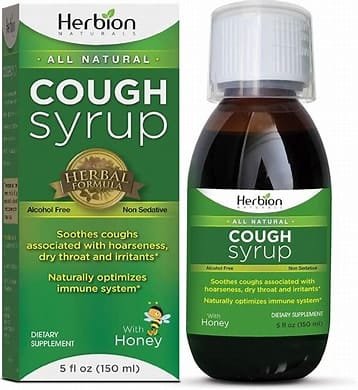Introduction

Cough syrup is one of the most commonly used over-the-counter medicines, which helps against cough and soothes the irritated mucous membranes of the throat. Many people of all ages use it, but its composition, uses, benefits, and possible risks are a prerequisite to safe and effective application.
Cough Syrup Composition Ingredients
Cough syrup contains a combination of active ingredients and excipients. There are mainly two types of major active ingredients:
Expectorants: Expectorants help loosen up mucus in the airways to aid in making coughing more productive. The most commonly used expectorant is guaifenesin.
Antitussives: These drugs relax the cough reflex itself. One of the most commonly used antitussive agents is dextromethorphan and can be found in many different preparations.
Other ingredients may include:
Antihistamines: Antihistamines are added to decrease allergic reactions that cause a cough and tend to have a drowsy effect.
Decongestants: Phenylephrine or pseudoephedrine are types of decongestants that help bring relief to nasal congestion due to a cold or allergies.
Honey, glycerin, or menthol may be added to relax the patient’s throat. Preparation Stage: How to Prepare Cough Syrup
Step for forming: Preparation of raw material: Active ingredients and excipients are obtained in requisite quantities from good manufacturing practices-compliant suppliers.
Formulation: Calculation of the quantity of ingredient for every ingredient on proper scientific calculations to get the result both in terms of efficiency and safety
Mixing: of all the drug ingredients in a non-sterile chamber in order to avoid contamination.
Quality Control: The syrup is subjected to all the stringent strength, purity, and safety tests before leaving the packing area.
Packaging: The product is filled into appropriate bottles. The bottles often carry child-resistant caps so that the chances of accidental ingestion can be prevented.
Uses of Cough Syrup

Cough syrups are basically administered for:
Relieving Coughing: It provides symptomatic relief for both dry and productive coughs.
Relieving Sore Throat: Most preparations contain agents that soothe the throat and help eliminate soreness.
Aiding Cold and Allergy Symptoms: Cough syrups can help with the symptoms of cold and allergies, such as congestion and postnasal drip.
Aiding Sleep: Depending on the type, some cough syrups, particularly those with antihistamines, may help an individual sleep a little better at night because of the diminished nocturnal coughing.
Types of cough syrups
Dry Cough Syrup: Dose that is given to suppress the cough if there is no mucus.
Productive Cough Syrup: This medicine makes it so that the airways can expel easily by loosening up the mucus.
Combination Syrups: Containing both expectorants and antitussives for comprehensive relief
Advantages of Cough Syrup
Calming Relief: Almost immediate relief from coughing, enabling sleep and return to better function with minimal interference from coughing.
Easy to administer: The syrup is liquid by nature, therefore easy to administer in children and the elderly.
Variety of options: There is a range of formulations to suit the differing types of coughs and associated symptoms.
Other than just treating cough, several cough syrups also alleviate the allied symptoms of cold and allergy, thus providing multifunctional relief.
Disadvantages of Cough Syrup
Side Effects: Since most antihistamine-containing syrups have a sedative effect, they may make one drowsy and dizzy with nausea and even cause gastrointestinal problems.
Risk of Abuse: Some antitussives, such as dextromethorphan, are abused for their psychostimulant effects that pose considerable risks to health.
Not for Everybody: Cough syrups do not suit everybody, particularly children, pregnant and lactating women, and a few individuals who have had medical histories.
Masking Symptoms: Cough syrups may suppress the symptoms but will not treat the actual reason behind the cough, which may be further delayed in a couple of months when the medical conditions are very critical.
Guidelines for Safe Use

Consultation with Healthcare Professionals
It is always a good recommendation to consult a healthcare provider before using a cough syrup, especially for children under 2 years.
Others with diseases
Users of other drugs: This is just in case there is an interaction with other drugs with the syrup.
Dosage and Administration
For the recommended dosage on the product’s label, one must read labels carefully because different drugs will have different dosages and certain active ingredients in a single formulation.
Use measuring tools: Use the measuring cup or spoon the prescription comes with.
Do not take more than the recommended dose or for a longer time than prescribed.
Storage
Cough syrup should be stored appropriately to ensure potency:
kept in a cool, dry place not subject to light.
Should be kept out of reach of children so as to prevent accidental ingestion.
Alternative Treatment Options for Cough
Apart from syrups, for those who do not want to have syrup treatment or have done their best to use home remedies, there are the following:
Honey: A natural cough suppressant, honey, could soothe an irritated throat and decrease the frequency of coughing.
Steaming. Inhalation of steam helps loosen up mucus and relieve congestion.
Warm Saltwater Gargle. It could soothe irritation of the throat and reduce the coughing.
Herbal Teas. Teas of ingredients like ginger, licorice root, or peppermint are extremely soothing and hydrating.
Conclusion
Cough syrup is a panacea for many of the different types of coughs. In addition to the advantages that the syrup promises, such as being easy to administer and giving quick relief, there are also need-to-know facts regarding its side effects and the need to consult health experts. Knowing what the composition entails, proper usage, and alternatives provide an individual with the necessary choice for implementing a cure for the cough and other respiratory disorders.



